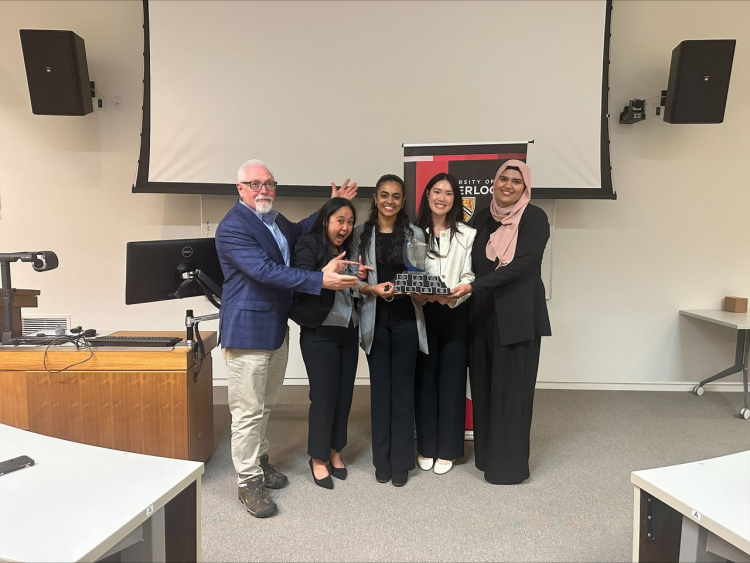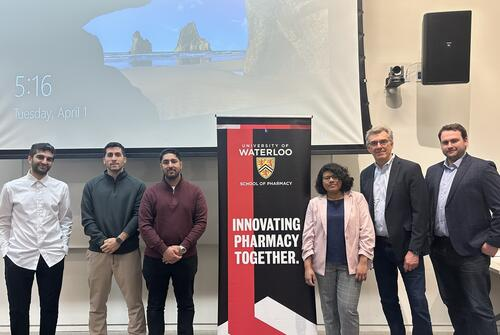An observation during a co-op work term has inspired a group of students from the University of Waterloo's School of Pharmacy to develop an innovative and inclusive tool that can help pharmacists source medications that meet specific dietary restrictions more effectively.
Many medications, including pill capsules, may contain gluten or ingredients derived from animal products or alcohol, which directly impacts individuals with diverse cultural, dietary or religious restrictions. While most software on the market integrates common allergies, it often lacks the capacity to address food intolerances and restrictions, leaving pharmacists to spend additional time sourcing suitable options for their patients.
The Pharmasave Business Competition awards a third-year Waterloo School of Pharmacy student team a $5,000 prize for an innovative business model in the field of pharmacy. Students work in teams as part of their PHARM 350 Fundamental Principles of Business Administration and Management course, to develop a startup that solves a current health care issue aligned with Ontario health care regulations and pitch their ideas to a panel of pharmacists, entrepreneurs and financial advisors.
When Doctor of Pharmacy students Julia Regina Cervantes, Jessica Chionglo, Anoosh Hajira and Giya Joseph began brainstorming business ideas for their course, they were inspired by Hajira's observation from a co-op work term. She noticed that the pharmacy team frequently wasted valuable time manually researching the patients' questions and concerns about their medications and whether they meet their cultural, religious or dietary needs.

From left: Dean Pacey, School of Pharmacy sessional lecturer, Julia Regina Cervantes, Giya Joseph, Jessica Chionglo and Anoosh Hajira
"Together, we reflected on our co-op work terms and despite encountering different patient dynamics, we realized we had all faced the same challenge," Joseph says.
"With a more diverse population, alternative medications were increasingly requested," Hajira adds. "I thought to myself, There has to be a more efficient way to look up restrictions and offer options tailored to patients' needs.'"
Through extensive market research, the team confirmed this is a significant and recurring challenge pharmacists face. This inspired the creation of their business idea, Praxis - a healthcare resource designed to help pharmacists navigate cultural and dietary restrictions to tailor patient-specific medications. From halal-friendly gel capsules to gluten-free options, Praxis addresses the dietary and cultural challenges that are present in community pharmacies.
"Integrating Praxis into their business will save pharmacies seven minutes per patient interaction," Chionglo says.
"With just a quick search, our software provides pharmacists with inclusive medication options tailored to each patient - within seconds," Joseph adds.
After surveying 53 pharmacists and pharmacy students, the team found a common theme: a significant gap in knowledge regarding cultural and religious restrictions in pharmaceuticals.
"This is a real issue that pharmacists face, that is negatively affecting community pharmacies," says Cervantes. "Solving this issue will have real-world impact that will create positive ripples directly in our communities."
Praxis, where pharmacy meets personalization, empowers pharmacists with the tools to confidently and accurately address patients' dietary and cultural restrictions to support informed decision making and ensuring patients feel understood and respected in their care.
"Each patient deserves to have their religious, cultural and dietary allergies considered, with therapeutic care tailored to their needs to improve their quality of life," Cervantes says.

Pharmasave Business Competition 2025 judges
"Something that could be insignificant to you, may be essential to someone else," Hajira says. "Just because a restriction isn't life threatening to a person, doesn't make it unimportant."
Cervantes, Chionglo, Hajira and Joseph are thankful for the meaningful connections they've made through the Waterloo community and are excited to use the $5,000 prize from the Pharmasave Business Competition to begin developing Praxis.
They plan to do more market research, network and pitch their business model to raise pre-seed capital. With funding acquired they are looking forward to working with a software developer to pilot, test and gain feedback to bring their meaningful idea to life.
"Beyond the counter, we hope that bringing Praxis to life will encourage pharmaceutical companies to be more transparent and to offer more inclusive options for patients at the manufacturing level," Chionglo says.
Funded by Pharmasave, the competition is held annually and tied to a third-year Waterloo Pharmacy course that has led to at least three real-world businesses. The competition pushes students to solve real-word challenges they encounter throughout co-op work terms and to become innovative health-care providers.










